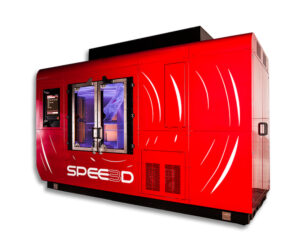
The British Army has requested the support of additive manufacturing company SPEE3D for the US Army Future Command’s Project Convergence 2022 as part of a concept assessment.
Together, they will showcase the WarpSPEE3D printer’s deployable technology to print metal 3D printed parts in the field and in various conditions.
The newest endeavor of the US Army’s Futures Command, Project Convergence is a flagship learning, experimentation, and demonstration campaign. From October 30 to November 9, 2022, in Fort Irwin, California, Project Convergence will evaluate approximately 300 technologies, focusing on advancing joint and multinational interoperability in future operational environments. Several thousand US, UK, and Australian service members, researchers, and industry partners will experiment with – and assess – these new advancements.
According to the company, SPEE3D’s unique, patented technology is 1,000 times faster than traditional 3D metal printing and offers an affordable additive manufacturing process to produce industrial quality metal parts from anywhere in just minutes.
Unlike most large additive manufacturing printers, SPEE3D does not rely on helium or other gasses. In addition, it does not require melting metals to produce parts from over 12 material sets, including copper, stainless steel, titanium, high-strength aluminum, and nickel-based carbides.
“We are thrilled to be invited by the British Army to collaborate and explore the capabilities and logistical impact of our additive manufacturing technology for the military,” said Byron Kennedy, Co-Founder, and CEO of SPEE3D. “Our partnership over the last two years with them has validated the need for 3D metal printing to solve a myriad of challenges the military faces, and in rough terrain where they need a deployable and easy-to-use solution to print important parts quickly.”
“SPEE3D regularly works with defense worldwide to showcase their innovative additive manufacturing technologies to help solve some of the military’s most pressing supply chain issues,” said the British Army’s Lieutenant Colonel Davidson Reith. “It’s our pleasure to be able to work with SPEE3D, giving the British Army the opportunity to learn lessons from a world-leading additive manufacturing company.”












